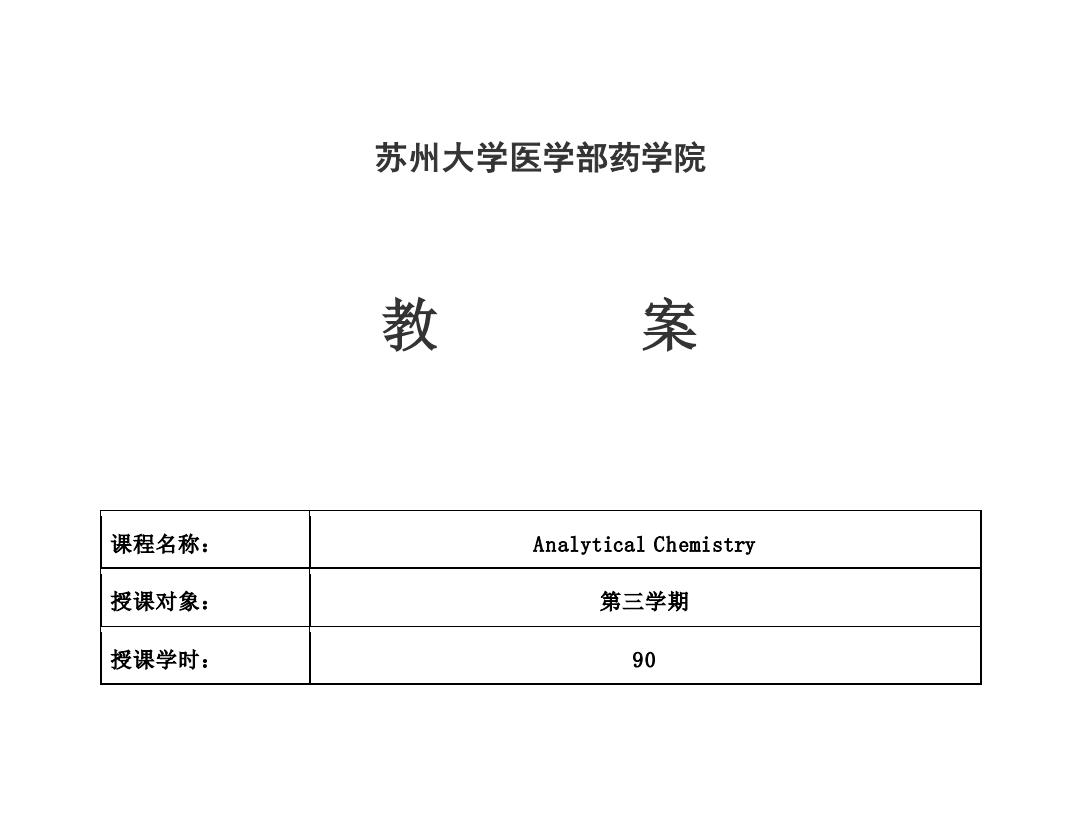
苏州大学医学部药学院 教 案 课程名称: Analytical Chemistry 授课对象: 第三学期 授课学时: 90
苏州大学医学部药学院 教 案 课程名称: Analytical Chemistry 授课对象: 第三学期 授课学时: 90
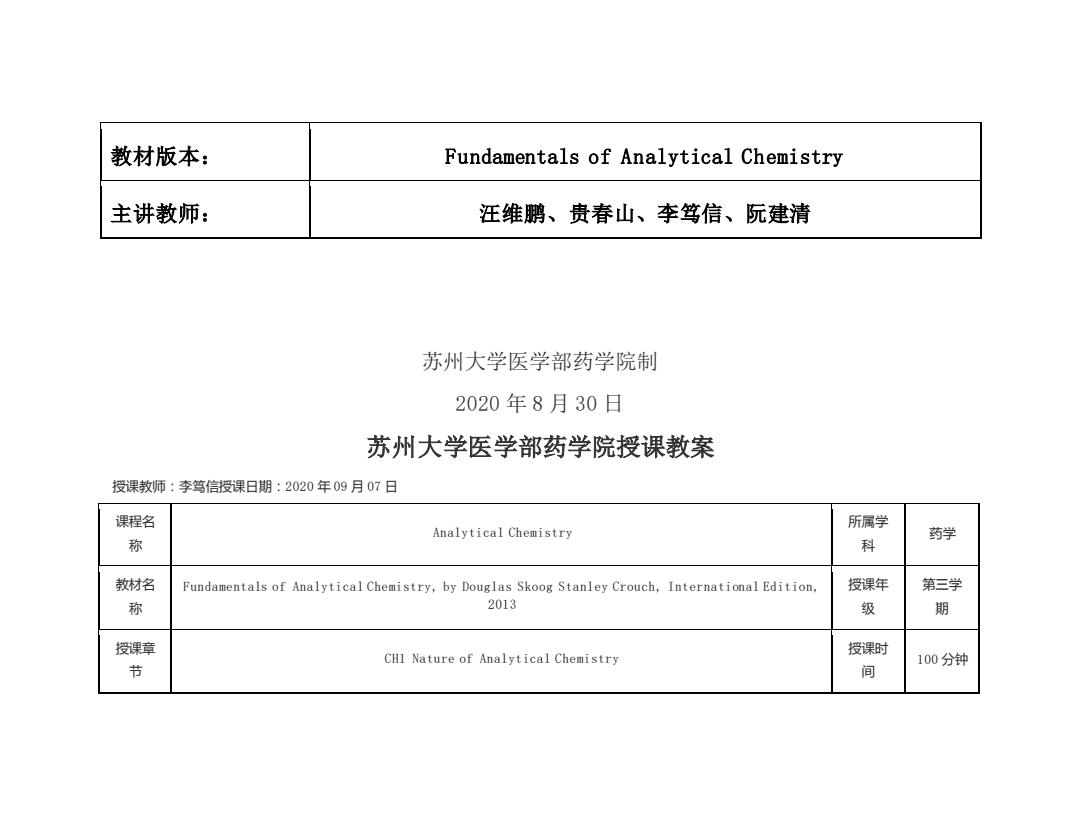
教材版本: Fundamentals of Analytical Chemistry 主讲教师: 汪维鹏、贵春山、李笃信、阮建清 苏州大学医学部药学院制 2020年8月30日 苏州大学医学部药学院授课教案 授课教师:李笃信授课日期:2020年09月07日 课程名 所属学 Analytical Chemistry 称 科 药学 教材名 Fundamentals of Analytical Chemistry,by Douglas Skoog Stanley Crouch,International Edition, 授课年 第三学 称 2013 级 期 授课章 授课时 CHI Nature of Analytical Chemistry 节 100分钟 间
教材版本: Fundamentals of Analytical Chemistry 主讲教师: 汪维鹏、贵春山、李笃信、阮建清 苏州大学医学部药学院制 2020 年 8 月 30 日 苏州大学医学部药学院授课教案 授课教师:李笃信授课日期:2020 年 09 月 07 日 课程名 称 Analytical Chemistry 所属学 科 药学 教材名 称 Fundamentals of Analytical Chemistry, by Douglas Skoog Stanley Crouch, International Edition, 2013 授课年 级 第三学 期 授课章 节 CH1 Nature of Analytical Chemistry 授课时 间 100 分钟
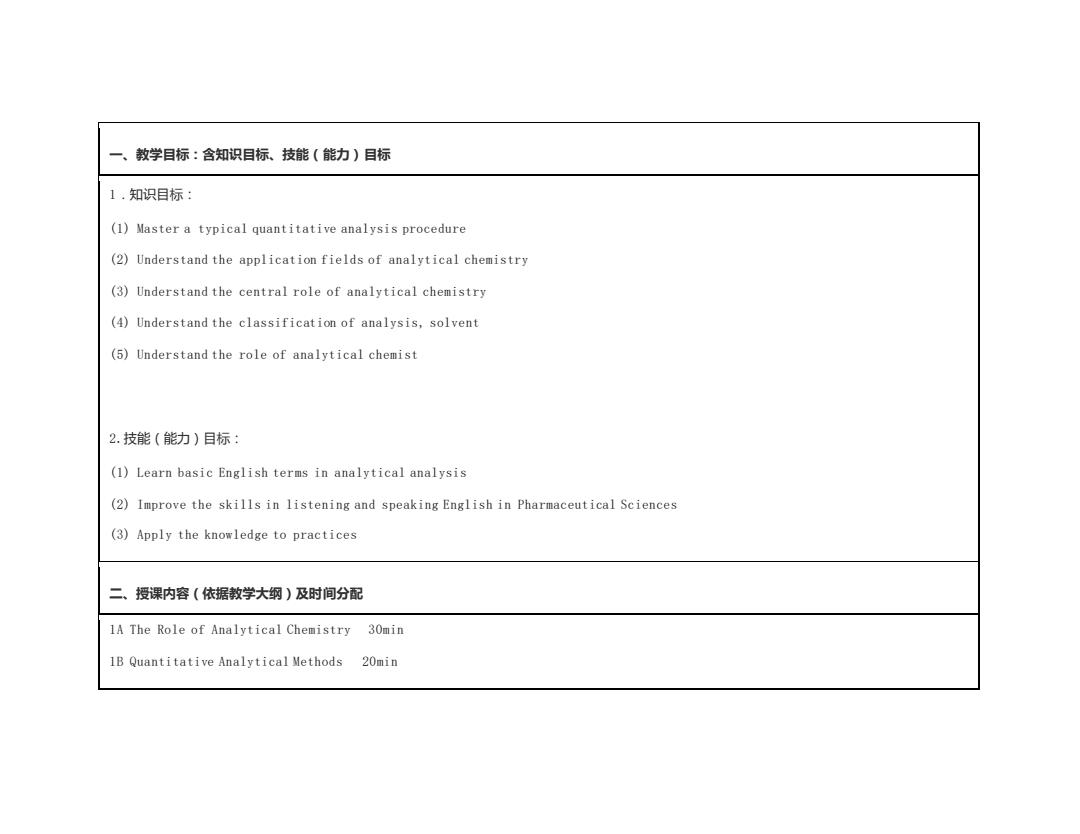
一、教学目标:含知识目标、技能(能力)目标 1.知识目标: (1)Master a typical quantitative analysis procedure (2)Understand the application fields of analytical chemistry (3)Understand the central role of analytical chemistry (4)Understand the classification of analysis,solvent (5)Understand the role of analytical chemist 2.技能(能力)目标: (1)Learn basic English terms in analytical analysis (2)Improve the skills in listening and speaking English in Pharmaceutical Sciences (3)Apply the knowledge to practices 二、授课内容(依据教学大纲)及时间分配 1A The Role of Analytical Chemistry 30min 1B Quantitative Analytical Methods 20min
一、教学目标:含知识目标、技能(能力)目标 1.知识目标: (1) Master a typical quantitative analysis procedure (2) Understand the application fields of analytical chemistry (3) Understand the central role of analytical chemistry (4) Understand the classification of analysis, solvent (5) Understand the role of analytical chemist 2.技能(能力)目标: (1) Learn basic English terms in analytical analysis (2) Improve the skills in listening and speaking English in Pharmaceutical Sciences (3) Apply the knowledge to practices 二、授课内容(依据教学大纲)及时间分配 1A The Role of Analytical Chemistry 30min 1B Quantitative Analytical Methods 20min
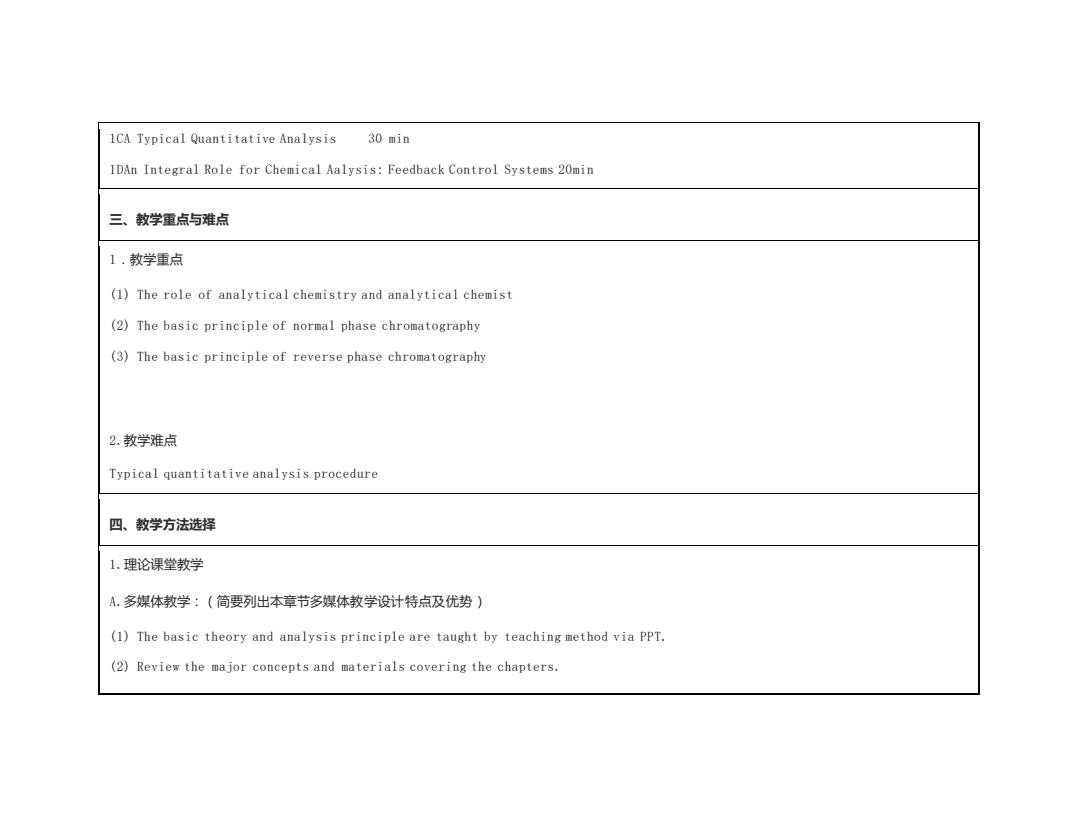
1CA Typical Quantitative Analysis 30 min 1DAn Integral Role for Chemical Aalysis:Feedback Control Systems 20min 三、教学重点与难点 1.教学重点 (1)The role of analytical chemistry and analytical chemist (2)The basic principle of normal phase chromatography (3)The basic principle of reverse phase chromatography 2.教学难点 Typical quantitative analysis procedure 四、教学方法选择 1.理论课堂教学 A.多媒体教学:(简要列出本章节多媒体教学设计特点及优势) (1)The basic theory and analysis principle are taught by teaching method via PPT. (2)Review the major concepts and materials covering the chapters
1CA Typical Quantitative Analysis 30 min 1DAn Integral Role for Chemical Aalysis: Feedback Control Systems 20min 三、教学重点与难点 1.教学重点 (1) The role of analytical chemistry and analytical chemist (2) The basic principle of normal phase chromatography (3) The basic principle of reverse phase chromatography 2.教学难点 Typical quantitative analysis procedure 四、教学方法选择 1.理论课堂教学 A.多媒体教学:(简要列出本章节多媒体教学设计特点及优势) (1) The basic theory and analysis principle are taught by teaching method via PPT. (2) Review the major concepts and materials covering the chapters
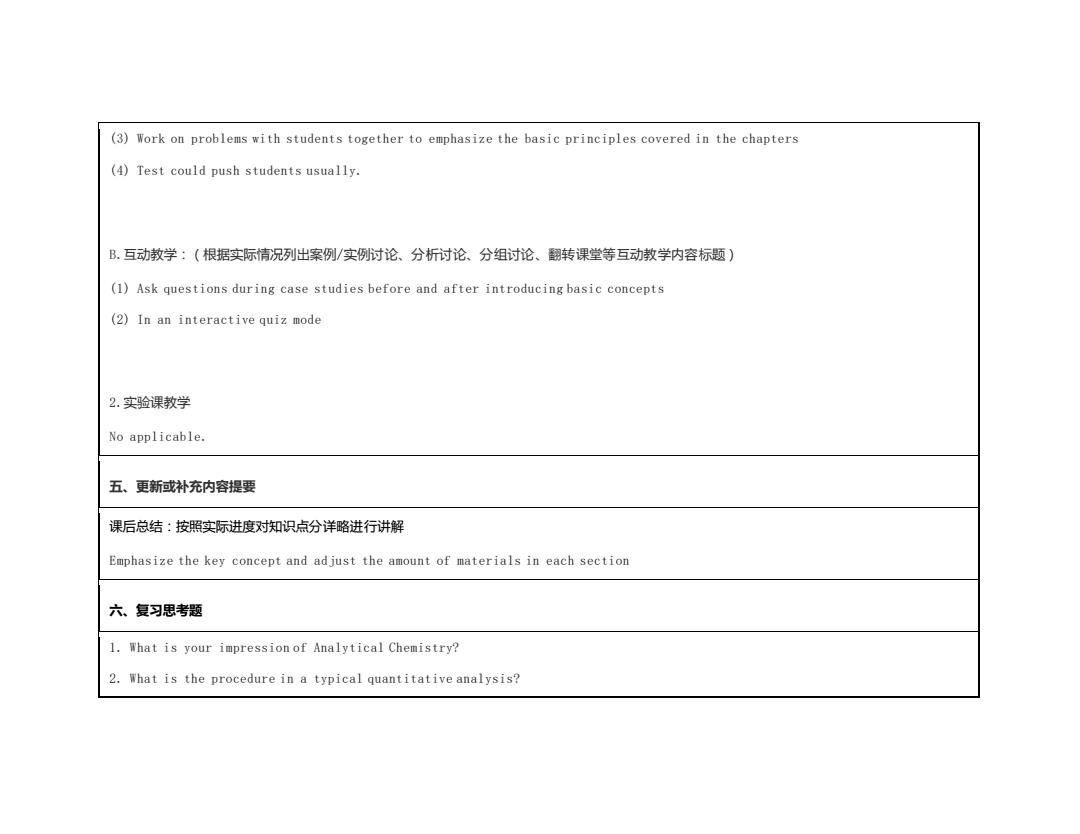
(3)Work on problems with students together to emphasize the basic principles covered in the chapters (4)Test could push students usually. B.互动教学:(根据实际情况列出案例/实例时论、分析讨论、分组讨论、翻转课堂等互动教学内容标题) (1)Ask questions during case studies before and after introducing basic concepts (2)In an interactive quiz mode 2.实验课教学 No applicable. 五、更新或补充内容提要 课后总结:按照实际进度对知识点分详略进行讲解 Emphasize the key concept and ad just the amount of materials in each section 六、复习思考题 1.What is your impression of Analytical Chemistry? 2.What is the procedure in a typical quantitative analysis?
(3) Work on problems with students together to emphasize the basic principles covered in the chapters (4) Test could push students usually. B.互动教学:(根据实际情况列出案例/实例讨论、分析讨论、分组讨论、翻转课堂等互动教学内容标题) (1) Ask questions during case studies before and after introducing basic concepts (2) In an interactive quiz mode 2.实验课教学 No applicable. 五、更新或补充内容提要 课后总结:按照实际进度对知识点分详略进行讲解 Emphasize the key concept and adjust the amount of materials in each section 六、复习思考题 1. What is your impression of Analytical Chemistry? 2. What is the procedure in a typical quantitative analysis?
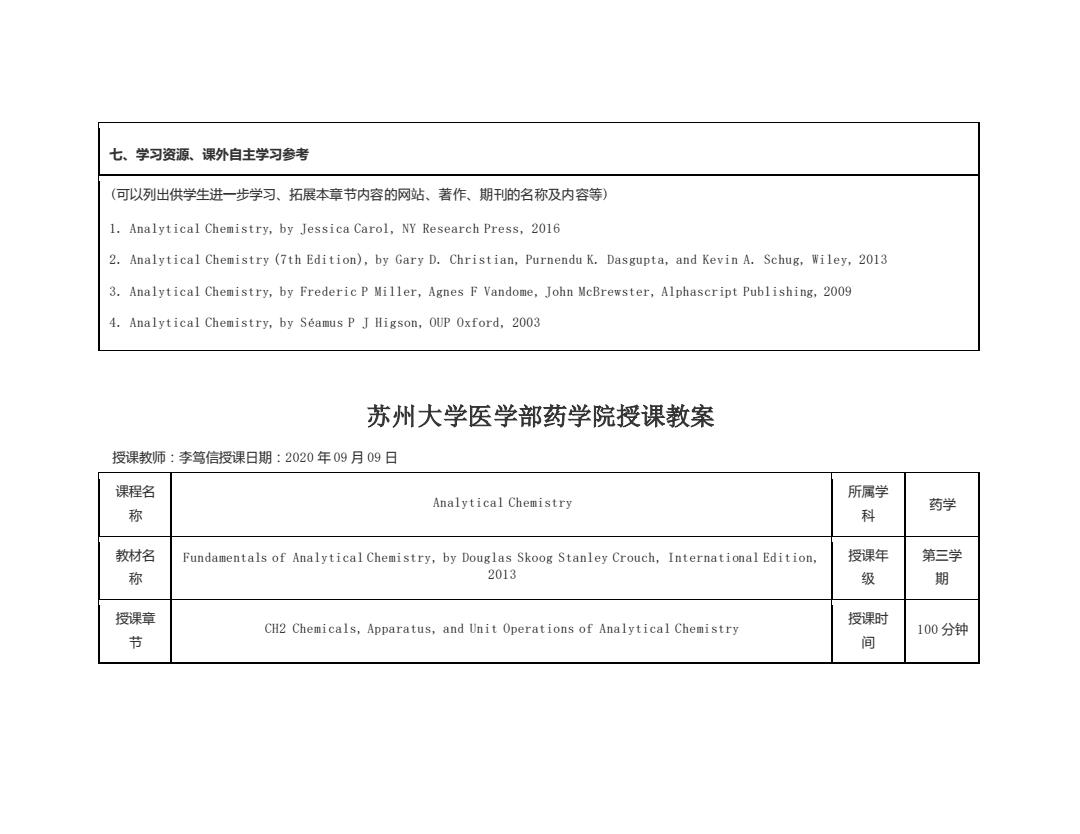
七、学习资源、课外自主学习参考 (可以列出供学生进一步学习、拓展本章节内容的网站、著作、期刊的名称及内容等) 1.Analytical Chemistry,by Jessica Carol,NY Research Press,2016 2.Analytical Chemistry (7th Edition),by Gary D.Christian,Purnendu K.Dasgupta,and Kevin A.Schug,Wiley,2013 3.Analytical Chemistry,by Frederic P Miller,Agnes F Vandome,John McBrewster,Alphascript Publishing,2009 4.Analytical Chemistry,by Seamus P J Higson,OUP Oxford,2003 苏州大学医学部药学院授课教案 授课教师:李笃信授课日期:2020年09月09日 课程名 所属学 Analytical Chemistry 药学 称 科 教材名 Fundamentals of Analytical Chemistry,by Douglas Skoog Stanley Crouch,International Edition, 授课年 第三学 称 2013 级 期 授课章 授课时 CH2 Chemicals,Apparatus,and Unit Operations of Analytical Chemistry 100分钟 节 间
七、学习资源、课外自主学习参考 (可以列出供学生进一步学习、拓展本章节内容的网站、著作、期刊的名称及内容等) 1. Analytical Chemistry, by Jessica Carol, NY Research Press, 2016 2. Analytical Chemistry (7th Edition), by Gary D. Christian, Purnendu K. Dasgupta, and Kevin A. Schug, Wiley, 2013 3. Analytical Chemistry, by Frederic P Miller, Agnes F Vandome, John McBrewster, Alphascript Publishing, 2009 4. Analytical Chemistry, by Séamus P J Higson, OUP Oxford, 2003 苏州大学医学部药学院授课教案 授课教师:李笃信授课日期:2020 年 09 月 09 日 课程名 称 Analytical Chemistry 所属学 科 药学 教材名 称 Fundamentals of Analytical Chemistry, by Douglas Skoog Stanley Crouch, International Edition, 2013 授课年 级 第三学 期 授课章 节 CH2 Chemicals, Apparatus, and Unit Operations of Analytical Chemistry 授课时 间 100 分钟
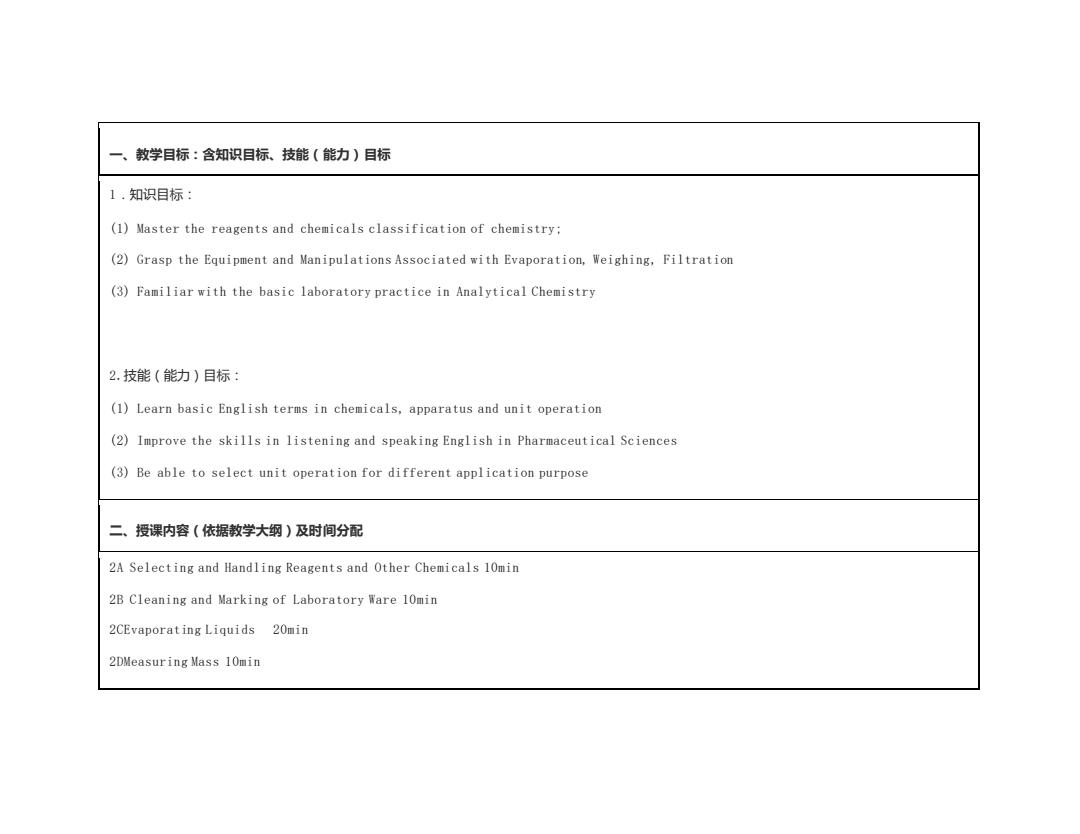
一、教学目标:含知识目标、技能(能力)目标 1.知识目标: (1)Master the reagents and chemicals classification of chemistry; (2)Grasp the Equipment and Manipulations Associated with Evaporation,Weighing,Filtration (3)Familiar with the basic laboratory practice in Analytical Chemistry 2.技能(能力)目标: (1)Learn basic English terms in chemicals,apparatus and unit operation (2)Improve the skills in listening and speaking English in Pharmaceutical Sciences (3)Be able to select unit operation for different application purpose 二、授课内容(依据教学大纲)及时间分配 2A Selecting and Handling Reagents and Other Chemicals 10min 2B Cleaning and Marking of Laboratory Ware 10min 2CEvaporating Liquids 20min 2DMeasuring Mass 10min
一、教学目标:含知识目标、技能(能力)目标 1.知识目标: (1) Master the reagents and chemicals classification of chemistry; (2) Grasp the Equipment and Manipulations Associated with Evaporation, Weighing, Filtration (3) Familiar with the basic laboratory practice in Analytical Chemistry 2.技能(能力)目标: (1) Learn basic English terms in chemicals, apparatus and unit operation (2) Improve the skills in listening and speaking English in Pharmaceutical Sciences (3) Be able to select unit operation for different application purpose 二、授课内容(依据教学大纲)及时间分配 2A Selecting and Handling Reagents and Other Chemicals 10min 2B Cleaning and Marking of Laboratory Ware 10min 2CEvaporating Liquids 20min 2DMeasuring Mass 10min
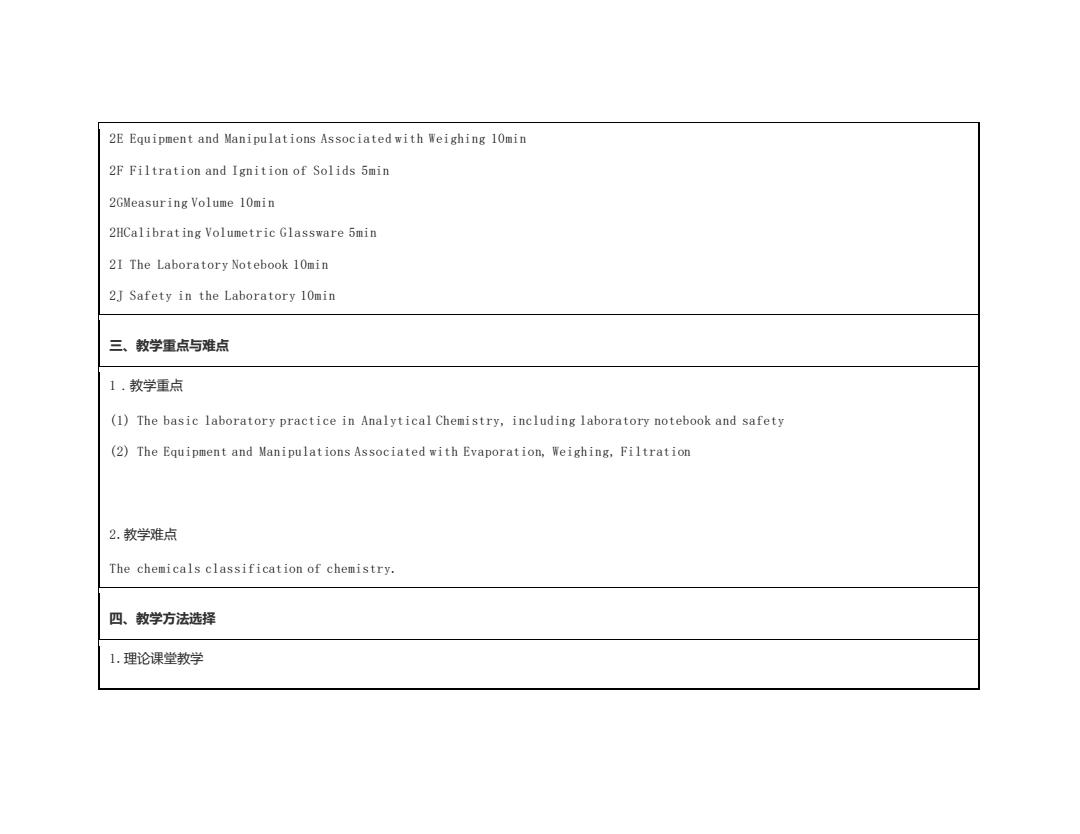
2E Equipment and Manipulations Associated with Weighing 10min 2F Filtration and Ignition of Solids 5min 2GMeasuring Volume 10min 2HCalibrating Volumetric Glassware 5min 21 The Laboratory Notebook 10min 2J Safety in the Laboratory 10min 三、教学重点与难点 1.教学重点 (1)The basic laboratory practice in Analytical Chemistry,including laboratory notebook and safety (2)The Equipment and Manipulations Associated with Evaporation,Weighing,Filtration 2.教学难点 The chemicals classification of chemistry. 四、教学方法选择 1.理论课堂教学
2E Equipment and Manipulations Associated with Weighing 10min 2F Filtration and Ignition of Solids 5min 2GMeasuring Volume 10min 2HCalibrating Volumetric Glassware 5min 2I The Laboratory Notebook 10min 2J Safety in the Laboratory 10min 三、教学重点与难点 1.教学重点 (1) The basic laboratory practice in Analytical Chemistry, including laboratory notebook and safety (2) The Equipment and Manipulations Associated with Evaporation, Weighing, Filtration 2.教学难点 The chemicals classification of chemistry. 四、教学方法选择 1.理论课堂教学
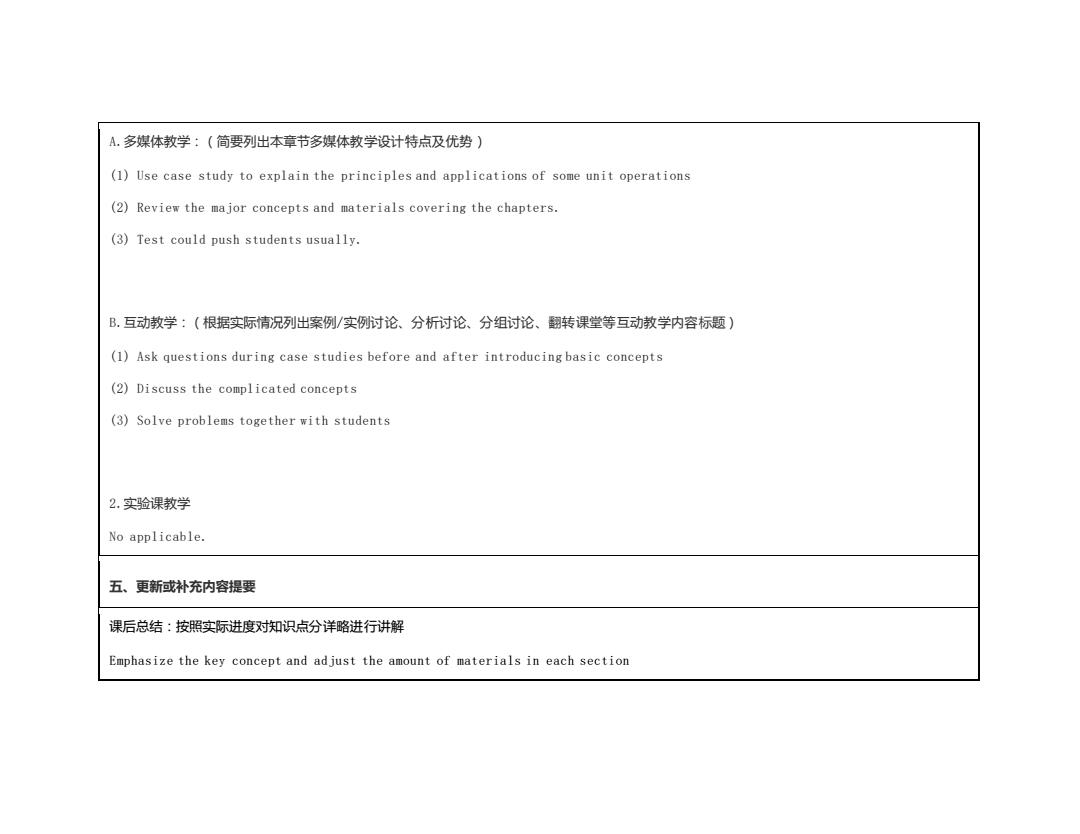
A.多媒体教学:(简要列出本章节多媒体教学设计特点及优势) (1)Use case study to explain the principles and applications of some unit operations (2)Review the major concepts and materials covering the chapters. (3)Test could push students usually. B.互动教学:(根据实际情况列出案例/实例讨论、分析讨论、分组讨论、翻转课堂等互动教学内容标题) (1)Ask questions during case studies before and after introducing basic concepts (2)Discuss the complicated concepts (3)Solve problems together with students 2.实验课教学 No applicable. 五、更新或补充内容提要 课后总结:按照实际进度对知识点分详略进行讲解 Emphasize the key concept and adjust the amount of materials in each section
A.多媒体教学:(简要列出本章节多媒体教学设计特点及优势) (1) Use case study to explain the principles and applications of some unit operations (2) Review the major concepts and materials covering the chapters. (3) Test could push students usually. B.互动教学:(根据实际情况列出案例/实例讨论、分析讨论、分组讨论、翻转课堂等互动教学内容标题) (1) Ask questions during case studies before and after introducing basic concepts (2) Discuss the complicated concepts (3) Solve problems together with students 2.实验课教学 No applicable. 五、更新或补充内容提要 课后总结:按照实际进度对知识点分详略进行讲解 Emphasize the key concept and adjust the amount of materials in each section
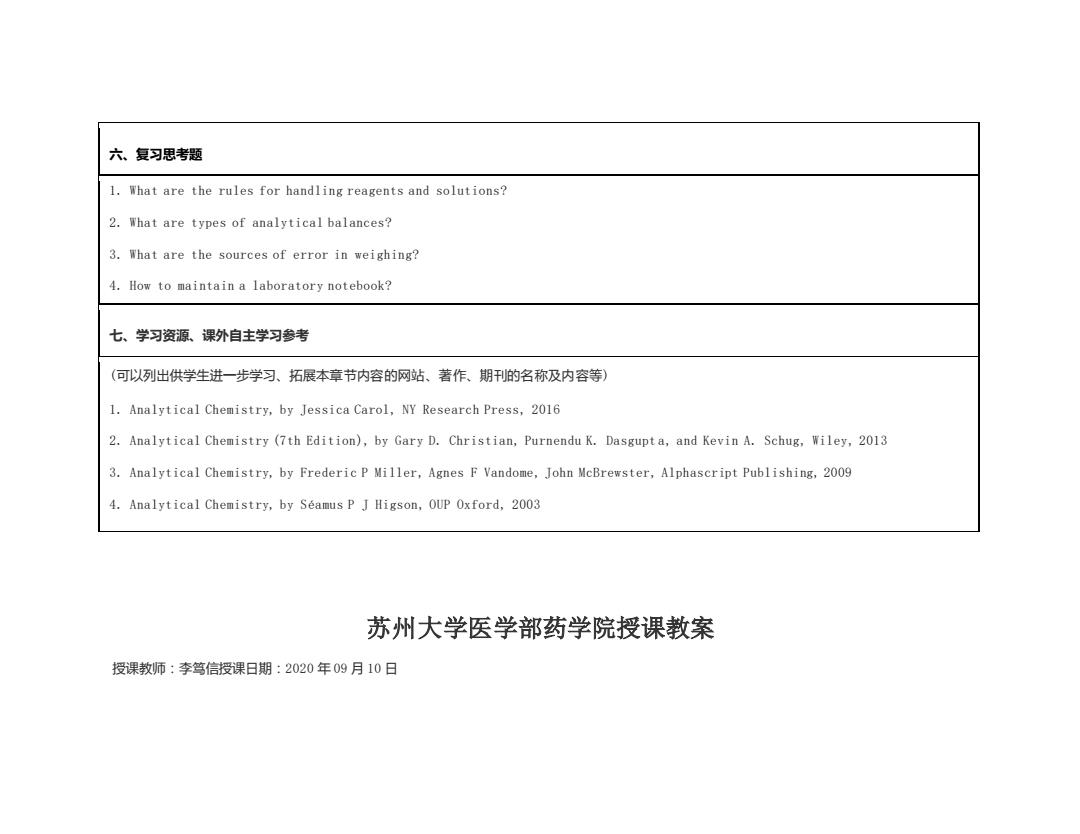
六、复习思考题 1.What are the rules for handling reagents and solutions? 2.What are types of analytical balances? 3.What are the sources of error in weighing? 4.How to maintain a laboratory notebook? 七、学习资源、课外自主学习参考 (可以列出供学生进一步学习、拓展本章节内容的网站、著作、期刊的名称及内容等) 1.Analytical Chemistry,by Jessica Carol,NY Research Press,2016 2.Analytical Chemistry (7th Edition),by Gary D.Christian,Purnendu K.Dasgupta,and Kevin A.Schug,Wiley,2013 3.Analytical Chemistry,by Frederic P Miller,Agnes F Vandome,John McBrewster,Alphascript Publishing,2009 4.Analytical Chemistry,by Seamus P J Higson,OUP Oxford,2003 苏州大学医学部药学院授课教案 授课教师:李笃信授课日期:2020年09月10日
六、复习思考题 1. What are the rules for handling reagents and solutions? 2. What are types of analytical balances? 3. What are the sources of error in weighing? 4. How to maintain a laboratory notebook? 七、学习资源、课外自主学习参考 (可以列出供学生进一步学习、拓展本章节内容的网站、著作、期刊的名称及内容等) 1. Analytical Chemistry, by Jessica Carol, NY Research Press, 2016 2. Analytical Chemistry (7th Edition), by Gary D. Christian, Purnendu K. Dasgupt a, and Kevin A. Schug, Wiley, 2013 3. Analytical Chemistry, by Frederic P Miller, Agnes F Vandome, John McBrewster, Alphascript Publishing, 2009 4. Analytical Chemistry, by Séamus P J Higson, OUP Oxford, 2003 苏州大学医学部药学院授课教案 授课教师:李笃信授课日期:2020 年 09 月 10 日